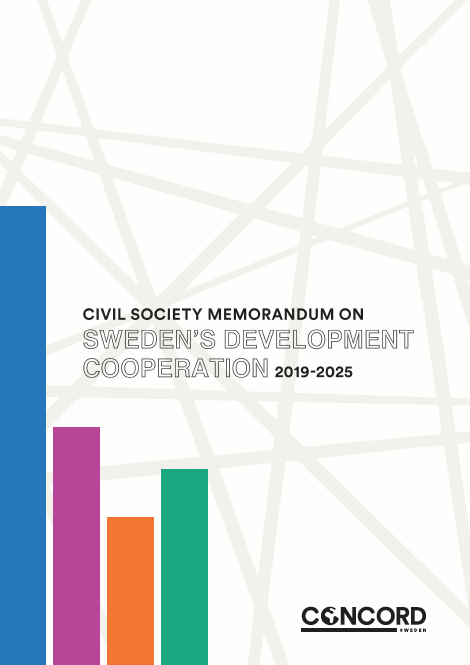In its 2019 final report, the DAC peer review characterised Sweden as a global leader in sustainable development. Since then, there are several downward trends in Sweden’s development assistance: decreasing ODA levels overall, decreasing resources for people in the most vulnerable countries, decreasing gender equality spending, and a decrease in the budget managed by Sida. A stagnant or decreasing funding has been the case even for most of the Government’s priority issues. Except for the strong support for Ukraine, the only policy areas where both political energy and aid budgets have been consistently committed are in areas unrelated to development cooperation goals: migration control and export promotion.
Therefore, we recommend the DAC peer review to focus on the following areas:
- The alignment of aid budget allocations for export promotion and migration control with international principles for effective development cooperation, the overall goals of Swedish development assistance, humanitarian principles and ODA rules.
- The effectiveness of Sweden’s development assistance to people in fragile states, conflict and post-conflict countries, and regions severely affected by climate change.
- The extent to which gender equality is systematically integrated and adequately resourced as a core component of Sweden’s foreign policy and development cooperation.
The previous DAC peer review report recognised, among other things, Sweden’s use of a multidimensional poverty approach to deliver on its pledge to leave no one behind, its continued leadership in providing gender-focused aid, and its strong commitment to development effectiveness principles. It also noted Sweden’s long-term partnerships with multilateral organisations, and its support for civil society organisations as an integral part of its pursuit of democratic governance.
In order to improve performance on DAC peer review standards, we recommend the Swedish Government to address the following areas:
- Reverse development budget cuts as soon as possible, with a clear path back to the one percent of GNI commitment, supplemented by additional grants to fulfill Sweden’s global climate finance commitments for loss and damage, adaptation, and emissions reductions.
- Ensure that Swedish development assistance serves its intended purpose—supporting people living in poverty and under oppression to improve their lives. The “reform agen¬da” should be implemented with evidence-based theories of change and adhere to principles of effective development cooperation, human rights, and international law.
- Establish a dedicated fund for Ukraine outside the regular aid budget to ensure that this unique support does not come at the expense of the poorest and most vulnerable people in the least developed countries and other regions affected by conflict and climate crises.
- Increase the share of Swedish development assistance allocated to gender equality to reverse the current downward trend in this area.
- Build on the policy commitment of a strengthened child rights perspective to ensure resources and attention for children in vulnerable situations, and invest in resilient societies that prioritise children, youth, human development and universal social protection.
- Abandon the approach of “reverse policy coherence”, where international cooperation serves Sweden’s short-term and narrow self-interests. Instead, set concrete action plans for Agenda 2030 and ensure that the commitment to a coherent policy for sustainable development is upheld across Government departments.
- Develop a plan to phase out in-donor refugee costs and as a first step lower the cap on such costs deducted from the aid budget.
- Commit to systematic and meaningful dialogue with stakeholders, including civil society in partner countries and in Sweden.
About the report
This report has been coordinated by CONCORD Sweden, the national platform for Swedish civil society organizations working together for a just and sustainable world. The contents of the report is the responsibility of the authors. It covers the same topics as the OECD DAC peer review of Sweden’s development assistance in 2019-2025. Based on the report, 36 organisations have signed joint Conclusions and recommendations.
The target audience of the report is the OECD DAC review team for the peer review of Sweden in 2026, as well as the Government unit responsible for compiling Sweden’s official memorandum. It is our ambition that the information in this memorandum will also be of interest to development practitioners, evaluators, policy makers and scholars in Sweden and abroad, who are monitoring and/or participating in Sweden’s development assistance.

